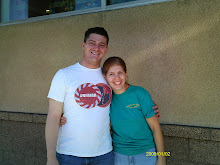The day was a warm Sunday in the middle of July. The location, Bill Black's adult Sunday school class at my grandmother's church, Somerset First Baptist. I gulped as I read the title of the lesson for the day: "Settle Down." It had been just over a month since I had come back to Texas from Korea, and this was a subject I had not yet mastered.
We had been talking about Jeremiah for some time in the Sunday school class, and now we had reached one of my favorite passages from the book, chapter 29. It was a letter to the captives of the Children of Israel from the Great I AM. The prophet had been trying to tell the Israelites that what they had been told about their captivity was a lie. Other prophets in Israel had told the people they would only be in Babylon two years, but Jeremiah was adamant that captivity would surely be 70.
"Jeremiah represents either a terrorist or a terrorist-sympathizer," our teacher commented. "These people rejected anything that he said because they thought they knew God and that He dwelt with them."
The Children of Israel truly thought they were in God's will as they prepared to live only briefly in a land not their own; yet God had a different plan for them. "Build houses [in Babylon] and dwell in them," He wrote through Jeremiah. "[P]lant gardens and eat their fruit... [B]e increase there and not diminished (29:5-6)." The LORD surely did assent to restore them to the Promised Land, but they first needed to settle into life as foreigners.
In the Israelites' obedience lay God's purpose: Only after going through captivity would they come to know God in a personal and fulfilling way. "For I know the thoughts I think toward you," reads verse 11, "thoughts of peace and not of evil, to give you a future and a hope. Then you will call upon Me and pray to Me and I will listen to you. You will seek Me and find Me when you search for Me with all your heart" (Jer 29:12-13). The captivity was designed not to alienate them from God, but to draw their hearts ever closer to Him.
"Do not let your prophets and your diviners who are in your midst deceive you," the LORD continues (Jer. 29:8). "Nor listen to your dreams which you cause to be dreamed... [for] I have not sent them, says the LORD." The Children of Israel had believed a false report about how long they would be in captivity, and now they needed to trust God in His timing to bring them out of it.
As I sat pondering my own unwillingness to trust God, the morning's commentary seemed to pinpoint my secret thoughts: "What unrealistic dreams have you been holding on to?" the margin screamed.
I gulped again. For the last month, I had done just as the Children of Israel had been instructed not to: I had believed the "dreams which you cause to be dreamed." I had listened to the desire to be overseas and because of this had become so disenchanted with living in the States that I refused to buy things like a cell phone, a car, and even an apartment. The conviction stung worse than a mesquite switch to the back of the thighs.
The Israelites' journey was beginning to mirror my own. "Seek the peace of the city where I have caused you to be carried away captive," the LORD declared to His people, just as I knew He was speaking to me at that moment. Perhaps being back home would be longer than I had originally thought. My responsibility would now need be to build and not tear down, and pray for the success of the city I am in, "for in its peace, you will have peace" (Jer 29:7).
"In the middle of the summer, I heard an amazing Bible study about settling down," I chatted to a friend a couple of weeks ago via Skype. "I haven't forgotten it."
"What did [the study] define 'settling down' as?" she asked.
"Learning to live in the place God has for you now, even if it's not the place of promise," I wrote. As I typed my response, I knew that confessing it, just as sure as walking it out, would be a leap of faith.
